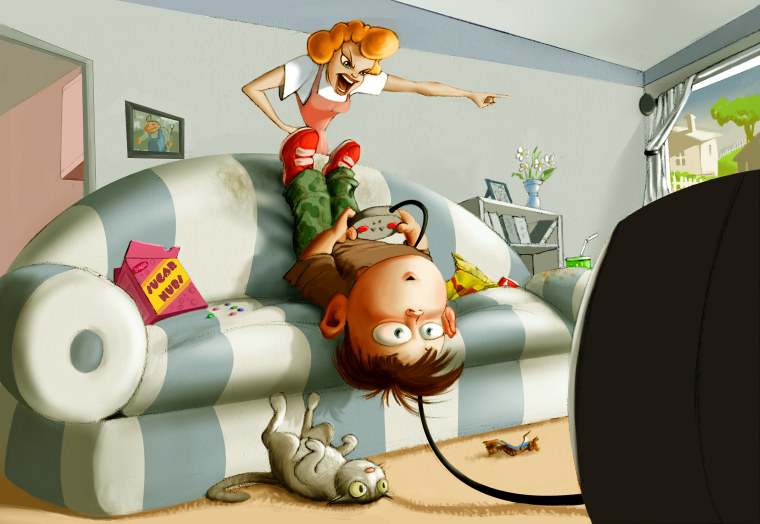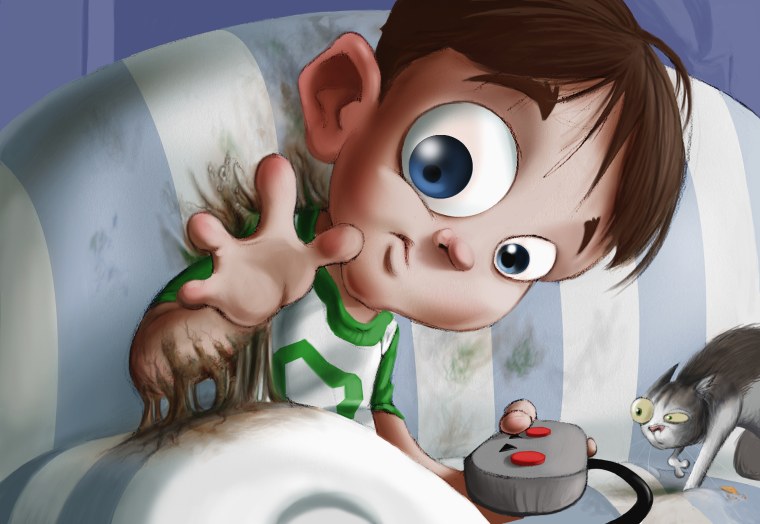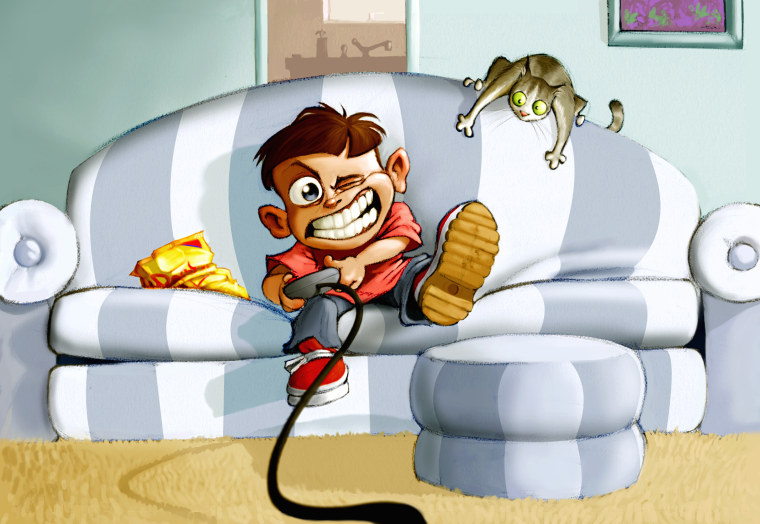Scott Langteau has this message for kids: Spend less time playing video games.
It’s a message that many a mom and dad have tried to impress upon many a youngster (and some not-so-youngsters) who spend perhaps a wee bit too much time with game controllers in hand.
But the 40-year-old Langteau isn’t a parent. He’s a veteran of the video game industry — one who played producer on three “Medal of Honor” games and co-founded his own game development company.
Langteau has just published a children’s book called “Sofa Boy,” which tells the story of a kid who spends too much time sitting on the couch with controller clutched in hand and the rather dire consequences that follow.
It’s a fairy tale plucked straight from Langteau's own experiences as a lad with a fondness for video games and his own bouts with a bit of game addiction.
But first, Langteau would like make one thing clear: “I’m not saying that you shouldn’t play video games. I think video games are great. I think they do great things for kids.”
Instead, Langteau says his book is all about a little something called “moderation.”
Perhaps you’ve heard of it?
“It’s about being well rounded,” he says. “Just like with anything else, we all need to make sure that there’s a variety in what we do.”
Video gamers and the video game industry can be a rather touchy bunch when it comes to accepting criticism about their favorite pastime. And understandably so. After all, most people who go around preaching the dangers of playing video games tend to be outsiders and fanatics — people who don’t play video games and certainly don’t understand that they can be a valuable and healthy form of entertainment.
But Langteau and “Sofa Boy” seem to be in a unique position to deliver a message of gaming moderation that the young game-savvy masses might actually listen to. After all, this is a man who understands what it means to be a kid with a passion for games.

Langteau grew up with 11 brothers and sisters in Wisconsin and recalls “the best Christmas ever” being the one when the Atari 2600 arrived under the tree. (Yeah, he’s old school like that.)
“My brother and I played it constantly,” he says.
In fact, Langteau has dedicated “Sofa Boy” to his younger brother — Dominic — with whom he spent countless hours playing not only Atari, but later consoles as well. Langteau says that Dominic ended up spending a particularly large amount of quality time with Zelda on the Nintendo Entertainment System.
“My biggest addiction was SimCity 2000,” Langteau admits. “It would be 5 o’clock in the morning and I would look up and say ‘whoa, I’ve got to go to bed.’ I mean, that’s when you know you have a problem — when time is flying by and the sun is coming up and you realize you haven’t gone to bed yet.”
Parents of today’s young game enthusiasts might be relieved to hear that Langteau’s game-playing fixation did lead to a successful career. He has worked for DreamWorks Interactive and Electronic Arts, first working on children’s games and then becoming an associate producer on the first “Medal of Honor” game. He went on to produce two more “Medal of Honor” titles — “Underground” and “Frontline.” And in 2002, he co-founded game development company Spark Unlimited, which developed “Call of Duty: Finest Hour” and, most recently, launched “Legendary” for the Xbox 360, PS3 and PC.
But in addition to gaming, writing has also been a passion for Langteau, who has a master’s degree in theater. In fact, “Sofa Boy” got its start as a poem he penned before he ever got into the video game biz.
“The inspiration for the poem was remembering how my brother and I were such sofa boys ourselves playing video games,” he says.
“Sofa Boy” is Langteau’s first book and one that plays out like a catchy modern parable.
The most peculiar of events
has taken place just up the block.
Where an average little family
has sent their neighbors into shock!
The story goes on to explain what happens to the little boy in the family.
You see, he’d sit and sit and sit
on his couch the whole day through.
He’d sit intensely playing games
‘til his trigger thumb turned blue!
Though the story is meant for younger readers, in the best Brothers Grimm style it comes with something of a dark twist. I don’t want to ruin the ending, so let’s just say that poor Sofa Boy becomes very attached to the couch he spends so much time sitting on.

Langteau says he strongly believes that games can be . “They improve your deductive reasoning, your decision making skills, and your problem solving skills,” he says. “And they help you think strategically.”
Still, Langteau — who names Dr. Seuss’ foreboding tale of environmental disaster, “The Lorax,” among his favorite books — says he hopes his book will be a good way for parents to chat with their kids about making smart decisions about the games they play and how they spend their time.
But all video game messages aside, “First and foremost I wanted to write ‘Sofa Boy’ because I thought it was a fun story,” Langteau says.
And it is a fun and whimsical fairy tale, one that’s decked out with some excellent illustrations by Rion Vernon, an artist who has worked as a character designer for the likes of EA, Nickelodeon and Paramount.
While the response to the book, which Langteau self-published and launched on Monday through Shake the Moon Books, has been largely positive so far, a few people on the gaming discussion boards have tossed out the H word to describe Langteau. That is: hypocrite.
Langteau does acknowledge that it is the job of game-makers to make games that are hard to put down. But he doesn’t believe there’s anything wrong with making engaging games while also reminding people — and especially kids — that there is such a thing as too much of a good thing.
“If we really do our job well, we make a game you want to play until the end. We do want to make it so engaging that you do really enjoy it,” he says. “But nothing should take your life away, you know?”
